Today, I am pleased to welcome, Victoria Goddard, a fantasy writer from Canada. Victoria has published a series of highly imaginative short stories. Her novel, Till Human Voices Wake Us, includes a reference to the fascinating Greek myth of Orpheus and Eurydice. Check out this small selection of Victoria’s books below!
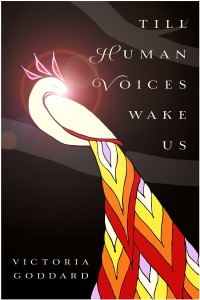 Raphael Amian came to Earth from the wreck of another world, walking the centuries immortal with the gifts of music and magic. As Orpheus in ancient Greece, the loss of his beloved Eurydice nearly broke him, and in his grief his uncontrolled power caused great destruction. Faced with the choice between love and duty, he chose duty, and repudiated both his music and his heart. Now he’s living in modern-day London as an actor, worn down by the weight of his conscience and his pride in keeping up appearances.
Raphael Amian came to Earth from the wreck of another world, walking the centuries immortal with the gifts of music and magic. As Orpheus in ancient Greece, the loss of his beloved Eurydice nearly broke him, and in his grief his uncontrolled power caused great destruction. Faced with the choice between love and duty, he chose duty, and repudiated both his music and his heart. Now he’s living in modern-day London as an actor, worn down by the weight of his conscience and his pride in keeping up appearances.
The end of winter brings with it the end of a contest he is playing with another immortal mage, whose prize is the world’s magic, and whose price may be its destruction. Raphael is willing to lose his power, his soul, and his life to make sure his adopted world doesn’t suffer the same fate as his original home. But three days before the crux of the game, his twin brother Kasian comes to find him — and along with unwelcome memories brings a gift that is far more dangerous than any weapon: hope.
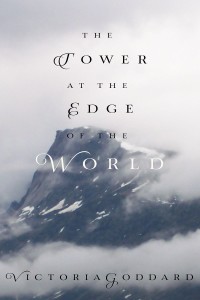 An unnamed young man lives in a tower at the edge of the world, content with the orderly rituals and freedom to study that his lot–or he is content, until one day he discovers something in a bird’s nest outside the tower window, and his efforts to reach it discover far more than he expects.
An unnamed young man lives in a tower at the edge of the world, content with the orderly rituals and freedom to study that his lot–or he is content, until one day he discovers something in a bird’s nest outside the tower window, and his efforts to reach it discover far more than he expects.
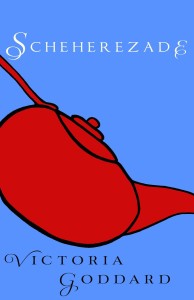 On the thousand and first night of Scheherezade the Storyteller’s marriage, things do not go at all as she had hoped — nor do they end as she had expected. A short story in the Tales from Ysthar collection.
On the thousand and first night of Scheherezade the Storyteller’s marriage, things do not go at all as she had hoped — nor do they end as she had expected. A short story in the Tales from Ysthar collection.
The Prince of the Fairies is just out looking for mischief. That’s not what he finds.
A short story in the Tales from Ysthar collection.
Hello Victoria and welcome to my blog!
Hi Fros, thank you for inviting me.
What has inspired you to write your novel, Till Human Voices Wake Us?
I was inspired to write Till Human Voices Wake Us because of an image I had in mind of a woman and a man engaged in some sort of duel of magic and swordsmanship, of obvious great moment, in Stonehenge. The particular moment was the woman fallen, the man above her, his sword between them—but she was smiling. What can I say, I was about fourteen! Fifteen years and many, many, many versions later, I finally published the book and figured out what the duel was about, which was not only the end of the world but also (as it must always be) clashing views about what it means to save it, and what’s worth giving up to do so. I was very surprised to find out that that duel is not the end, but only the midpoint, of the story. The real climax happens because of the choice that Raphael (the man) and Circe (the woman) made there.
I hear you’re preparing for a new launch these days. Would you tell us a little about that?
Yes, it’s called Stargazy Pie. I discovered that there is such a pie: a fish pie from Cornwall, which is notable because it involves whole fish with the heads sticking out! I had the yen to write some mystery-fantasy stories set in a town I’d been imagining for a few years, and I’ve always been intrigued by the occasional mentions in the Miss Marple stories about the missing bag of shrimp, that had such curious consequences—consequences we never find out, because Miss Marple is invariably interrupted at that point. So in homage to Miss Marple’s mysteriously missing bag of shrimp, I have a mysteriously appearing fish pie. The rest of the series more or less is developing from young Mr. Greenwing, back from university, finding the pie on the town fountain. Neither he nor anyone else is expecting a cult.
Sounds absolutely intriguing! What was the first thing you ever wrote and how old were you then?
The first thing was a short story on “how the hawk got a red tail” for a grade 2 project–I found it recently while cleaning out a box at my parents’ house. The second thing was a short story of the long-lost-humans-rediscovering-Eden variety (I was twelve) … and the third was the first iteration of what eventually became Till Human Voices Wake Us.
What other writing have you done? Anything else published?
I’ve written several short stories, three of which are about secondary characters in Till Human Voices Wake Us—“Scheherezade,” “Inkebarrow,” and “Rook,” and several more that are connected to my wider narrative universe. I think I’m proudest of The Tower at the Edge of the World, a long short story or novelette that is the prequel to a series I am hoping to start later this year.
Do you see yourself in any of your characters, or do any of them have traits you wish you had?
I seem to keep writing about people who are excellent musicians—that’s a trait I wish I had! I play the flute badly, and that’s about it. Then I write about Orpheus charming the trees to walk … The other thing my characters tend to be good at is focus and determination and having the courage to go on adventures. Raphael, the main character in Till Human Voices Wake Us, is very, very determined, and the sort of man who prized duty over everything—or almost everything, as he learns in that story. Fitzroy, the main character (albeit unnamed) in The Tower at the Edge of the World, and a core character for stories yet to come, has very few inhibitions, great ideas, and a fantastic sense of humor, and is very brave. When procrastinating I say to myself sometimes, But Raphael would do that … and when doubting a course of action I’d like to do but am afraid of, I definitely think of Fitzroy courting the Moon or being seriously awesome. When I got stuck halfway up a very steep incline/near-cliff in the Lake District when walking across England in 2013, I kept repeating to myself that they would finish. It helped in its own way, and made me more determined than ever to make sure that Fitzroy’s friend Jullanar, who goes off on adventures with him, is utterly ordinary. Not magical, not extraordinarily beautiful, not superlatively gifted with the sword (or music) or anything else, not even super-smart. Just your ordinary sort of young woman, doing amazing things. We need those in books too.
I love the idea of using a character to get motivated. Got to try that! What are you working on at the moment? Tell us a little about your current project(s).
I’m currently working on the Greenwing and Dart series of somewhat quirky fantasy adventure/mysteries, which are set in a world like a cross between post-collapse Rome, Regency England/18th c. northern Europe, and medieval university towns. Magic definitely exists but has gone decidedly out of fashion, a matter of concern to my heroes, two young gentlemen of fashion who don’t know quite what to do about all the magic they keep stumbling into. Stargazy Pie is the first one—it should be coming out in June, followed by Sops-in-Wine later in the summer.
Which are your favorite authors, and what do you love about them?
I tend to have favorite books more than authors, but I love the classic British fantasy and mystery writers, particularly Dorothy L. Sayers, C.S. Lewis, G.K. Chesterton, and J.R.R. Tolkien. They were all medievalists, like me, too. Of contemporary authors, Connie Willis wrote one of my favorite books—To Say Nothing of the Dog—whose humor, whimsy, characters, and the way it plays the game of allusions appeal greatly to me. I also love Lois McMaster Bujold’s trilogy The Curse of Chalion, Paladin of Souls, and The Hallowed Hunt, for the combination of world-building, theology, plotting, and sheer wonderfulness of characters. And then Patricia McKillip’s Riddle-Master of Hed—again for the world, the characters, and also the beauty of her prose. I like most of her books, but the Riddle-Master trilogy and The Bell at Sealy Head are my favorites.
Of classic literature, I love Dante for the Divine Comedy and the late Roman writer Boethius’ Consolation of Philosophy. But I wrote my doctoral dissertation on them, so I’m a bit biased. But I love their language, their structure, their incredible insights into human nature, philosophy, and theology, and their senses of humor. And since I like the game of allusions—hunting out references to other books—I love that both the Consolation and the Comedy are full of allusions to other books (including each other—well, Dante alludes to Boethius), and also obviously major material for later authors. I’ll never forget coming to the end of Paradiso for the first time, when Dante enters the Earthly Paradise, and thinking to myself: “This is Aslan’s country!”
Last, every time I come across The Odyssey I am reminded of how great it is. I love how perfect one of the oldest pieces of literature is. What story-tellers there must have been in the far past, if we have The Iliad, The Odyssey, and The Epic of Gilgamesh (to jump a sea and a few millennia even further back) to show for it!
What genres do you read mostly, and what are you reading now?
I read a combination of literary fantasy—mythopoeic fantasy, as the society calls it—the classics (especially pre-Renaissance ones, though I am fond of Romantic poetry and am trying to get into the great 18th and 19th century novelists), and books on gardening, farming, permaculture, and basically any random topic of the sort. I am also trying to read more indie authors, and branching (slowly) into romance—largely Regency—and some other areas of fantasy. Right this moment I am reading The Builder’s Secret, a book about amateur house builders, selections from Steele and Addison’s 18th-century papers The Tatler and The Spectator, and I just picked up Kristine Kathryn Rusch’s Fantasy Life. I just finished Stephen Brust’s The Phoenix Guards—which should probably go under my favorites, too—and since I’ve just been reading a bunch of articles about the Odyssey, well, I guess it’s about time to re-read it.
Are there any sites or writing tools that you find useful and wish to recommend?
I find both Kristine Kathryn Rusch’s and her husband, Dean Wesley Smith’s, blogs to be excellent. Full of advice, great comments sections, interesting ideas, and aggravating ones too. I have learned a huge amount from their blogs, books, and the two online workshops I’ve taken of theirs.
Tell us about your website/blog. What will readers find there?
My author website is still rather basic, but my blog (The Rose and Phoenix Inn) has a range of topics. I’d been writing about my stories in April, but I usually write about a mix of things like gardening, what I’m reading, where I’m traveling, literature (especially Dante’s Divine Comedy), and putting together interesting things for the pantry. I expect there will be more gardening and house-building stuff to come, as I’m hoping to buy land this summer.
Being an author involves a lot of sitting around. What do you do for exercise?
I like walking and gardening, so that’s what I tend to do most of—at least in the summer! This past winter I took up snowshoeing, and hope to take up cross-country skiing again in future. We had about five feet of snow on the ground for four months this year, so we need to make sure there are outdoor activities in the winter. I’ve also been looking into treadmill desks, but I haven’t quite got that to work yet. I think setting an alarm so I get up every hour, together with a dog to walk regularly, are really good ideas.
Have you brought any photos to show us today?
Yes, I brought two pictures I took while walking down the length of England. The one of me was taken in Oxford. The other one is of an inn in the village of Inkberrow, near Stratford-upon-Avon, which both partly inspired “Inkebarrow” and also represents my love of fantasy-land pubs, whence the name of my blog.
Thank you for this interview, Victoria, it’s been great to have you.
Thank you, Fros, it’s been a pleasure.
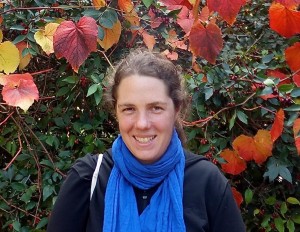 Victoria Goddard is a fantasy novelist, gardener, and occasional academic. She has a PhD in Medieval Studies from the University of Toronto, walked across the length of England in 2013, and is hoping to build her own house soon. After a tenure as sexton at a church in Halifax, Nova Scotia, she now lives on Prince Edward Island.
Victoria Goddard is a fantasy novelist, gardener, and occasional academic. She has a PhD in Medieval Studies from the University of Toronto, walked across the length of England in 2013, and is hoping to build her own house soon. After a tenure as sexton at a church in Halifax, Nova Scotia, she now lives on Prince Edward Island.
Visit Victoria’s Amazon page
Visit Victoria’s website
Visit Victoria’s blog
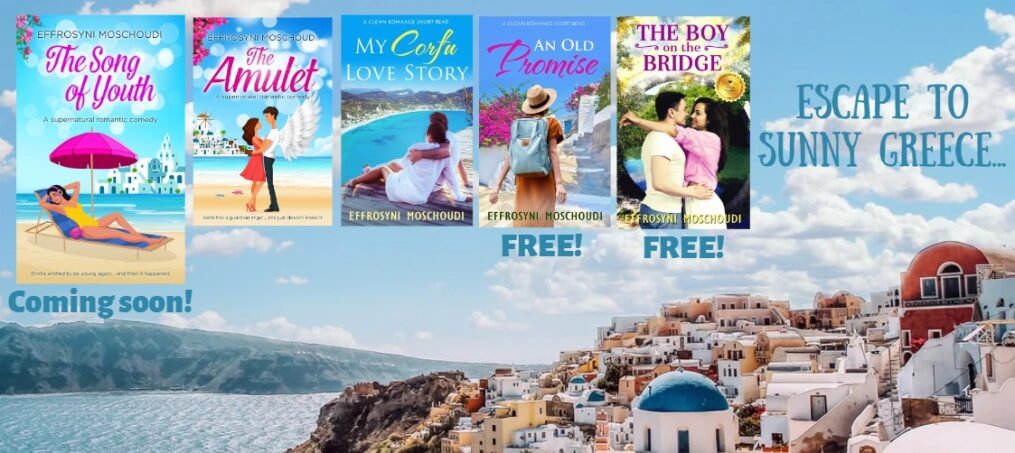
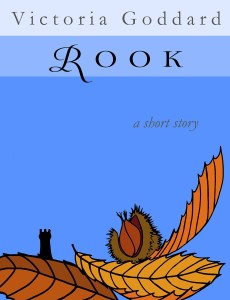

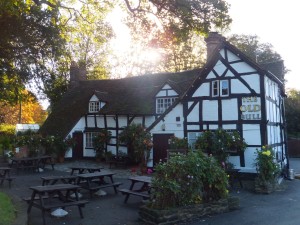

Fascinating interview and an interesting list of titles – love the covers.
Thank you for stopping by, sweet Mary 🙂
Hi Mary,
Thanks! I’ve really been enjoying learning how to do the covers–I still have a ways to go in mastering Adobe Illustrator (let alone Photoshop), but it lets me use some other elements of my creative imagination, which I appreciate.
— Victoria
Victoria, I am astounded to hear you made these lovely covers yourself! Well done, girl, and thank you for your comment 🙂 It’s been awesome to have you on the blog 🙂
Great interview and a fascinating author.. and I love the covers too. Thanks ladies.
Thank you for your kind words, Sally. I appreciate your visit 🙂